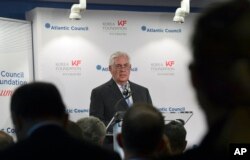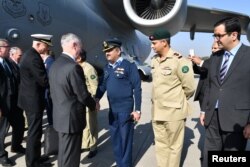The United States has warned Pakistan it could lose control of its territory unless Islamabad abandons ties with terrorist groups operating in the country that are growing in "size and influence."
U.S. Secretary of State Rex Tillerson issued the warning as Washington and Islamabad renew efforts to improve bilateral relations and find "common ground" to promote peace in neighboring Afghanistan.
"We want to work with Pakistan to stamp out terrorism within their boundaries as well, but Pakistan has to begin the process of changing its relationship with the Haqqani Network and with others," Tillerson said at a public talk in Washington on Tuesday.
A U.S.-led military coalition is helping the Afghan National Defense and Security Forces (ANDSF) to contain a resurgent Taliban insurgency.
Insurgents and leaders of a group allied with the Haqqani Network are allegedly orchestrating attacks from sanctuaries in Pakistan, with the help of the neighboring country's spy agency.
"Pakistan has allowed so many terrorist organizations to find safe haven within its territories, and these organizations are growing in size and influence," Tillerson said.
The secretary said he had warned Pakistani leaders that the terrorist groups might turn their attention from Kabul and decide they like Islamabad better as a target. He cautioned, "If they're not careful, Pakistan is going to lose control of their own country."
While there has been no formal response to Tillerson's remarks, a senior Pakistani government official has rejected the U.S. assertions as unfounded.
"In the last three years, our counterterrorism operations have effectively dismantled all terrorist groups on Pakistani soil while more than 200,000 of our troops are still deployed to areas bordering Afghanistan to consolidate the gains," the official told VOA, requesting anonymity.
The Pakistani government has also vowed to take action against any terrorists on its soil linked to the Afghan violence if U.S. officials share "actionable" intelligence with Islamabad.
Tillerson on Tuesday indicated Washington might start sharing such information because it is really concerned about Pakistan's stability.
"We want to work with them in a positive way. We're willing to share information with them and we want them to be successful. But we cannot continue with the status quo, where terrorist organizations are allowed to find safe haven inside of Pakistan," he said.
Earlier this month, U.S. Defense Secretary Jim Mattis visited Islamabad, where he also called on Pakistani leaders to redouble efforts against terrorist groups operating out of their country. He also called for Pakistan to play its vital role in promoting a process in Afghanistan to end the conflict there.
At a public talk in Islamabad following the Mattis visit, Foreign Minister Khawaja Asif reiterated that his country had made unmatched sacrifices in the fight against terrorism and was making all possible efforts to promote peace talks between the Afghan government and the Taliban.
"Peace in Afghanistan is of extreme importance to us. We are almost on all the platforms or forums from where peace in Afghanistan is being pursued. Our participation is with total sincerity with total commitment," Asif said.
He added that continued Afghan hostilities were hampering Pakistan's efforts to improve its economy and expand its trade to central Asian states.
"I think after Afghanistan the biggest stakeholder in peace in this region or in Afghanistan, is Pakistan," the foreign minister asserted.






